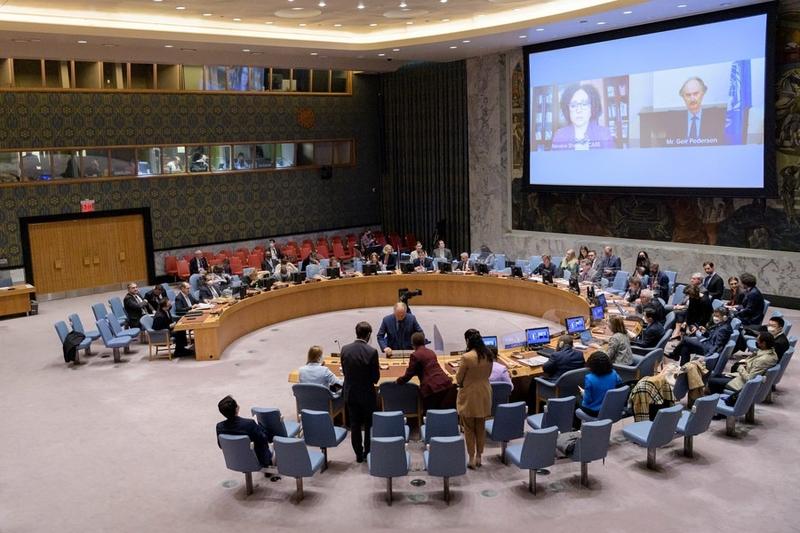 UN Special Envoy for Syria Geir Pedersen (right, on the screen) speaks via a video link at a Security Council meeting on the situation in Syria, at the UN headquarters in New York, on April 26, 2022. (MANUEL ELIAS / UN / HANDOUT VIA XINHUA)
UN Special Envoy for Syria Geir Pedersen (right, on the screen) speaks via a video link at a Security Council meeting on the situation in Syria, at the UN headquarters in New York, on April 26, 2022. (MANUEL ELIAS / UN / HANDOUT VIA XINHUA)
UNITED NATIONS - Geir Pedersen, the UN's special envoy for Syria, said on Tuesday that only a political solution could bring peace to the country.
"This political solution is the only path to sustainable peace," Pedersen told the UN Security Council, speaking from the Swiss city of Geneva via video link.
The envoy appealed for the council to support his efforts to move the parties closer to a negotiated political solution to end the 11-year conflict in Syria.
The UN has a three-month plan to respond to the outbreak, and calls for US$34.4 million to assist 162,000 with health services, and 5 million with water, sanitation and hygiene assistance
Pedersen reported on his recent "busy period of diplomatic engagement" with key Syrian and international stakeholders, including in connection with the stalled Constitutional Committee meetings in Geneva.
"Sadly, we are a long way from this goal at present, and there are challenging diplomatic and ground realities that make advancing towards a comprehensive solution difficult. But the status quo should not be acceptable and there are ways forward," he said.
ALSO READ: Senior Hamas delegation to visit Syria for 1st time in years
So far, the political process has not delivered for the Syrian people, and conflict remains "very active" across the country, said Pedersen.
Listing examples, he said the terrorist group ISIL remains a serious threat. One of the largest weapons caches since its fall was recently discovered in the northeast, underscoring the insurgents' continued capacity to carry out attacks.
There were also reports of pro-government airstrikes in northwest Syria, where none had been reported in a long time.
Meanwhile, in the northeast, drone strikes, mutual shelling and confrontations have been reported between the Syrian Democratic Forces on the one hand, and Türkiye and armed opposition groups on the other.
The envoy said he is pushing for all stakeholders "to engage on step-for-step confidence building measures" towards advancing Resolution 2254, which was adopted by the Security Council in 2015 and outlines a roadmap for a peace process in Syria.
ALSO READ: Syria demands immediate withdrawal of US forces
"The key Syrian and international stakeholders need to rebuild their confidence that cooperation on Syria is possible, that the other side is willing and able to deliver, and that Syria can be firewalled from other conflicts. That confidence can only be built by concrete actions," he stressed.
So far, some countries have identified "concrete areas for potential steps," but talks need to go further, he said.
The envoy also continues his work to unblock obstacles surrounding the reconvening of the Syrian Constitutional Committee, which comprises representatives from the government, the opposition and civil society.
The Security Council also heard how communities in Syria are struggling to survive amidst a spiraling security, public health and economic crisis.
Reena Ghelani, a director in the UN's humanitarian affairs office, OCHA, provided an update on the cholera outbreak in Syria.
ALSO READ: Syria cholera death toll rises to 29
More than 20,000 suspected cases of the waterborne disease have been confirmed so far, and at least 80 people have died. "This is a tragedy, but it should not come as a surprise," she said.
The outbreak is further compounded by factors such as poor rainfall in many locations, severe drought-like conditions, and damaged water infrastructure.
The UN and partners have been sounding the alarm on the water crisis in northern Syria for at least the past year, said Ghelani, adding that the crisis is likely to get even worse with an increased probability for below-normal precipitation and above-normal temperatures.
The UN has a three-month plan to respond to the outbreak, and calls for US$34.4 million to assist 162,000 with health services, and 5 million with water, sanitation and hygiene assistance.


